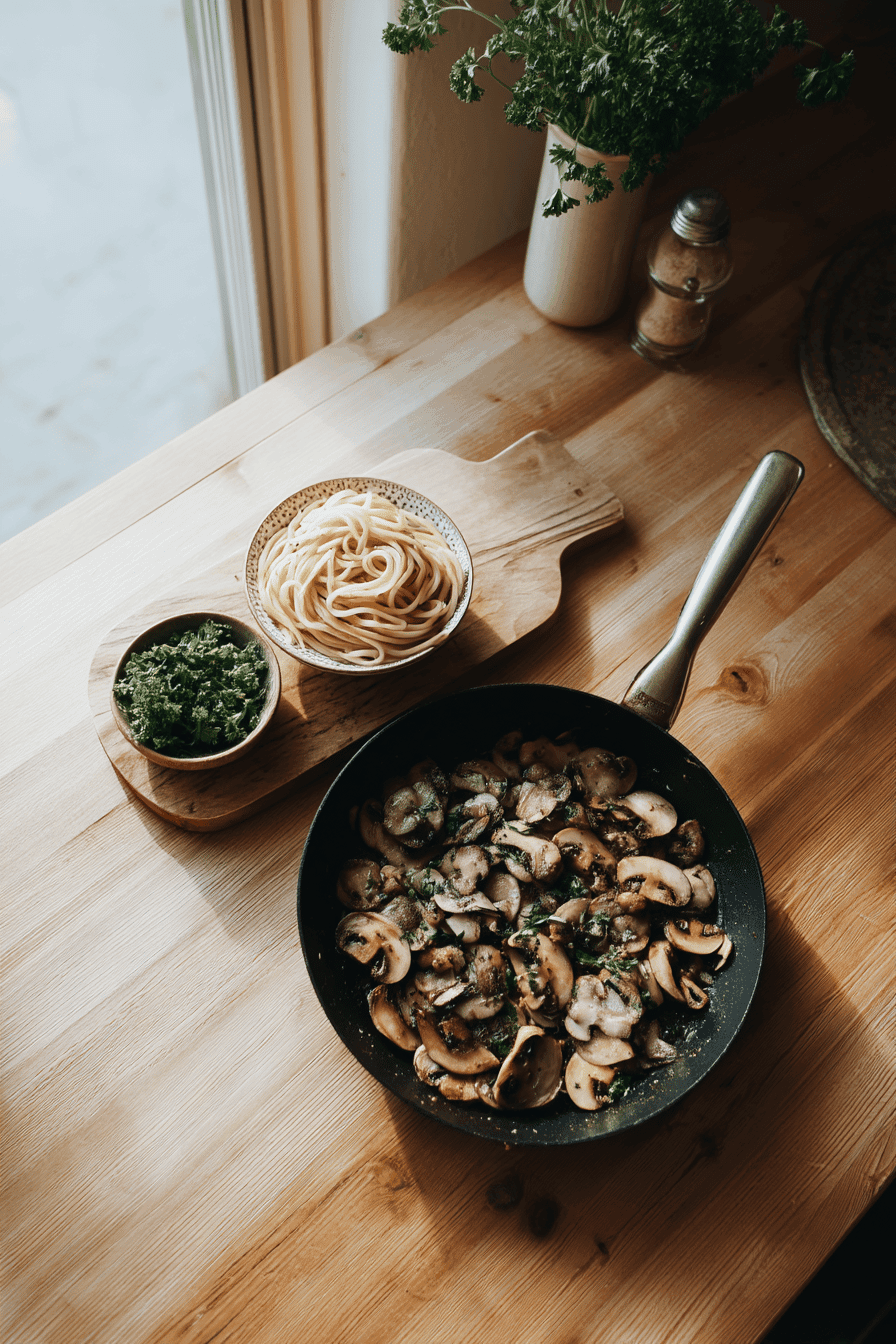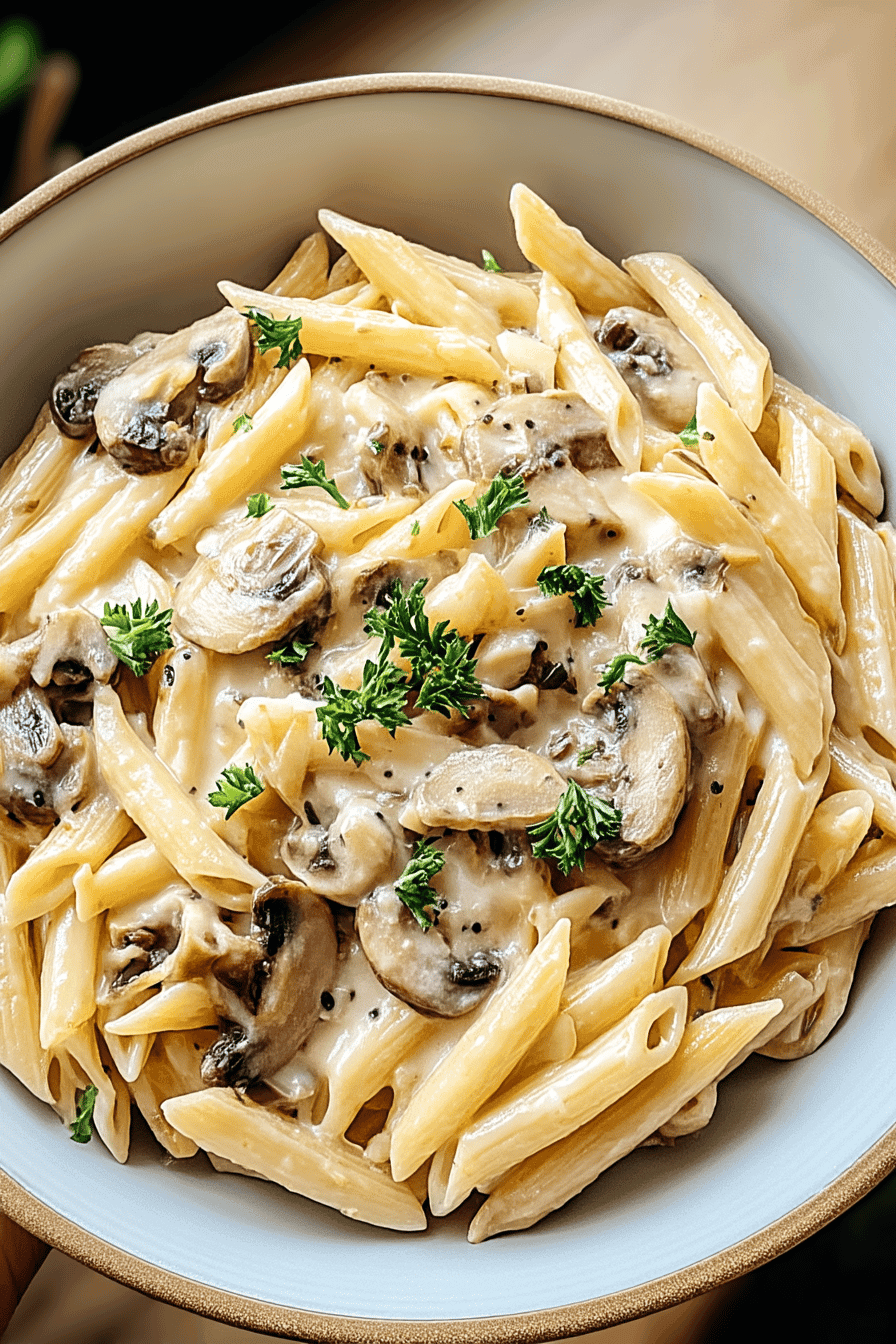Benefits and Advantages of Garlic Mushroom Pasta
Garlic mushroom pasta offers a delicious and nutritious meal option that is easy to prepare, making it ideal for busy weeknights or quick lunches. Its simple combination of ingredients allows even novice cooks to master the dish quickly. The recipe is packed with health benefits, thanks to nutrient-rich mushrooms which provide antioxidants and vitamins, and garlic, known for its immune-boosting properties. This dish stands out because it balances rich flavors with wholesome ingredients, offering a satisfying yet light meal. Additionally, the versatility of garlic mushroom pasta means it can be adapted to various dietary needs, including vegan and gluten-free diets, without compromising taste or texture. Using fresh ingredients enhances the overall flavor profile, making it a standout pasta dish in everyday cooking.
Jump to:
- Benefits and Advantages of Garlic Mushroom Pasta
- Essential Ingredients for Garlic Mushroom Pasta
- Dietary Substitutions to Customize Your Garlic Mushroom Pasta
- How to Prepare the Perfect Garlic Mushroom Pasta: Step-by-Step Guide
- Mastering garlic mushroom pasta: Advanced Tips and Variations
- How to Store garlic mushroom pasta: Best Practices
- Nutritional Value of garlic mushroom pasta
- FAQs: Frequently Asked Questions About garlic mushroom pasta
- How do I make garlic mushroom pasta from scratch?
- What types of mushrooms and pasta work best in garlic mushroom pasta?
- Can I add protein or extra vegetables to garlic mushroom pasta?
- What is the best way to store and reheat leftovers of garlic mushroom pasta?
- Can I substitute ingredients like broth or pasta in garlic mushroom pasta recipes?
- Creamy Garlic Butter Mushroom Pasta Recipe for Rich and Savory Flavor
- Ingredients
- Instructions
- Last Step:
- Notes
- Nutrition
- Did you make this recipe?
Essential Ingredients for Garlic Mushroom Pasta
- 200g of pasta (gluten-free options like rice or corn pasta are available)
- 300g fresh mushrooms (such as cremini or button mushrooms)
- 4 cloves of garlic, finely minced
- 2 tablespoons of olive oil
- 1/2 cup vegetable broth
- 1/4 cup nutritional yeast (vegan substitute for cheese)
- Salt and pepper to taste
- Fresh parsley for garnish
The olive oil provides healthy fats, while garlic enhances flavor and health benefits. Mushrooms add a meaty texture and are a good source of fiber and protein. Vegetable broth keeps the dish moist and adds depth without dairy. Nutritional yeast is perfect for those seeking a cheesy flavor without animal products. For low-calorie diets, use whole wheat or vegetable-based pasta to increase fiber and nutrients while reducing calories. These ingredients together create a balanced, wholesome dish suitable for a variety of dietary preferences.

Dietary Substitutions to Customize Your Garlic Mushroom Pasta
For vegan adaptations, replace traditional pasta with gluten-free, egg-free varieties and use nutritional yeast instead of cheese to maintain a rich flavor. Gluten-free diets can swap traditional pasta for quinoa or rice pasta. Those aiming for low-calorie intake can opt for spiralized vegetables like zucchini or shirataki noodles to reduce carbohydrates significantly. Dairy-free versions avoid butter and substitute olive oil or vegan margarine. Soy-free alternatives use vegetable broth free from soy derivatives. To boost protein content, consider adding plant-based meat substitutes or legumes like chickpeas. These substitutions ensure garlic mushroom pasta remains adaptable and inclusive, satisfying most dietary restrictions without sacrificing taste or texture.

How to Prepare the Perfect Garlic Mushroom Pasta: Step-by-Step Guide
- Bring a large pot of salted water to a boil and cook your chosen pasta according to package instructions until al dente. Drain and set aside, reserving some pasta water.
- While the pasta cooks, heat 2 tablespoons of olive oil in a large skillet over medium heat. Add finely minced garlic and sauté until fragrant but not browned, about 1-2 minutes.
- Add sliced mushrooms to the skillet. Cook, stirring occasionally, until they release their moisture and turn golden brown, about 5-7 minutes. This step remains the same for vegan or dairy-free versions.
- Pour in 1/2 cup vegetable broth and allow it to reduce slightly, scraping any brown bits from the pan to develop flavor.
- Stir in nutritional yeast or vegan parmesan alternatives, seasoning with salt and pepper to taste.
- Add the cooked pasta to the skillet, tossing gently to combine with the mushroom sauce. If the mixture seems dry, add reserved pasta water a tablespoon at a time until desired consistency is achieved.
- Garnish with chopped fresh parsley and serve immediately. Optional toppings like toasted nuts or vegan cheese can further enhance the dish.
This step-by-step approach guarantees a flavorful and adaptable garlic mushroom pasta suitable for all diners.
Mastering garlic mushroom pasta: Advanced Tips and Variations
To take your garlic mushroom pasta to the next level, consider using a variety of mushrooms such as shiitake, cremini, and oyster for a richer and more complex flavor. Gently sauté garlic over low heat to maximize its aroma without bitter notes. Fresh herbs like thyme or rosemary can be added during cooking to lend subtle earthiness. For a more decadent sauce, incorporate a splash of dry white wine or red wine like Merlot, which deepens the flavor and adds acidity. Consider topping the dish with toasted pine nuts or chopped walnuts for crunch and nuttiness. Adding leafy greens such as spinach or kale can boost nutrition and provide color contrast. For a dairy-free variation, swap Parmesan with nutritional yeast and butter with olive oil or vegan margarine. To increase protein, grilled tofu or tempeh cubes make excellent additions. Experiment with different short, ridged pasta shapes like Toscani that hold the sauce well, or try long pastas like pappardelle for variation. These tweaks enhance the dish’s versatility while maintaining its comforting essence.
How to Store garlic mushroom pasta: Best Practices
Proper storage helps maintain the taste and texture of garlic mushroom pasta. Follow these guidelines for best results:
- Cooling: Allow the pasta to cool completely at room temperature before storing to prevent condensation and sogginess.
- Refrigeration: Transfer the pasta to an airtight container and refrigerate promptly. It will stay fresh for up to 3-4 days.
- Freezing: For longer preservation, portion the pasta into freezer-safe containers or bags, leaving space for expansion, and freeze for up to 2 months. Note that pasta texture may alter slightly upon freezing.
- Reheating: Thaw frozen portions overnight in the fridge if possible. Reheat gently in a skillet over low heat with a splash of vegetable broth or water to restore the sauce’s silkiness. Microwave reheating is convenient but stir midway to avoid uneven heating and dryness.
Proper handling ensures garlic mushroom pasta retains its luxurious flavor and creamy texture.
Nutritional Value of garlic mushroom pasta
Garlic mushroom pasta delivers a balanced and nourishing meal, rich in vitamins, minerals, and macronutrients:
| Nutrient | Approximate Amount per Serving | Health Benefit |
|---|---|---|
| Calories | ~450 kcal | Provides moderate energy for a balanced meal |
| Protein | ~13 g | Supports muscle health and fullness, mainly from mushrooms and pasta |
| Fat | Varies depending on olive oil and butter quantities | Includes healthy monounsaturated fats from olive oil |
| Carbohydrates | Moderate, influenced by pasta choice | Primarily from pasta, providing sustained energy |
| Fiber | Good source due to mushrooms and whole wheat or vegetable-based pasta | Supports digestion and gut health |
| Vitamins and Minerals | Rich in potassium, vitamins A and C | Boosts immune function and antioxidant levels |
To learn more about the Health Benefits of Mushrooms and how to prepare pasta perfectly, visit How to Make Perfect Pasta.

FAQs: Frequently Asked Questions About garlic mushroom pasta
How do I make garlic mushroom pasta from scratch?
What types of mushrooms and pasta work best in garlic mushroom pasta?
Can I add protein or extra vegetables to garlic mushroom pasta?
What is the best way to store and reheat leftovers of garlic mushroom pasta?
Can I substitute ingredients like broth or pasta in garlic mushroom pasta recipes?

Creamy Garlic Butter Mushroom Pasta Recipe for Rich and Savory Flavor
🍄 Indulge in this Creamy Garlic Butter Mushroom Pasta for a rich, savory meal that’s packed with flavor and free from heavy cream.
🧄 With a medley of mushrooms and garlic, this dish offers a luxurious dining experience in just 30 minutes, perfect for weeknight dinners.
- Total Time: 30 minutes
- Yield: 4 servings 1x
Ingredients
8 ounces dry pasta (short shapes like Toscani or long types like pappardelle or spaghetti)
1/3 cup extra virgin olive oil
1 tablespoon butter (or 3 to 4 tablespoons if preferred)
2 shallots or 1/2 medium onion, minced
5 garlic cloves, minced
8 ounces baby bella mushrooms
8 ounces white button mushrooms
8 ounces portobello mushrooms
Kosher salt to taste
Black pepper to taste
1 teaspoon rosemary
3 tablespoons tomato paste
1/4 cup dry red wine or 1/4 cup chicken/vegetable broth
1/2 to 3/4 cup reserved starchy pasta cooking water
1/2 cup freshly grated Parmesan cheese
1/3 cup packed chopped fresh parsley
1/3 cup chopped walnuts
Optional: Red pepper flakes for mild heat and additional parsley for garnish
Instructions
1. Cook the pasta in salted boiling water until al dente. Reserve 1/2 to 3/4 cup of the pasta water and drain the rest.
2. Heat olive oil and butter in a skillet over medium-high heat. Sauté minced shallots or onion and garlic for 2–3 minutes until fragrant.
3. Add the mushrooms and cook for 7–10 minutes, stirring occasionally, until they release juices and caramelize.
4. Season with salt, pepper, and rosemary. Stir in tomato paste and wine or broth.
5. Add reserved pasta water to create a sauce, simmer for 4–5 minutes.
6. Toss in the drained pasta, adding more pasta water if needed for creaminess.
7. Mix in Parmesan and parsley. Sprinkle with walnuts and red pepper flakes if using.
8. Serve hot, garnished with extra parsley.
Last Step:
Please leave a rating and comment letting us know how you liked this recipe! This helps our business to thrive and continue providing free, high-quality recipes for you.Notes
🍂 Clean mushrooms with a damp towel to prevent sogginess.
🔪 Slice mushrooms 1/4 to 1/2 inch thick for texture.
🌿 Use short, ridged pasta shapes to better hold the sauce.
- Prep Time: 10 minutes
- None: 0 minutes
- Cook Time: 20 minutes
- Category: Main Course
- Method: Stovetop
- Cuisine: Italian
- Diet: Vegetarian
Nutrition
- Serving Size: 1/4 of recipe
- Calories: 450 kcal
- Sugar: value unavailable
- Sodium: value unavailable
- Fat: value unavailable
- Saturated Fat: value unavailable
- Unsaturated Fat: value unavailable
- Trans Fat: value unavailable
- Carbohydrates: value unavailable
- Fiber: value unavailable
- Protein: 13 g
- Cholesterol: value unavailable







